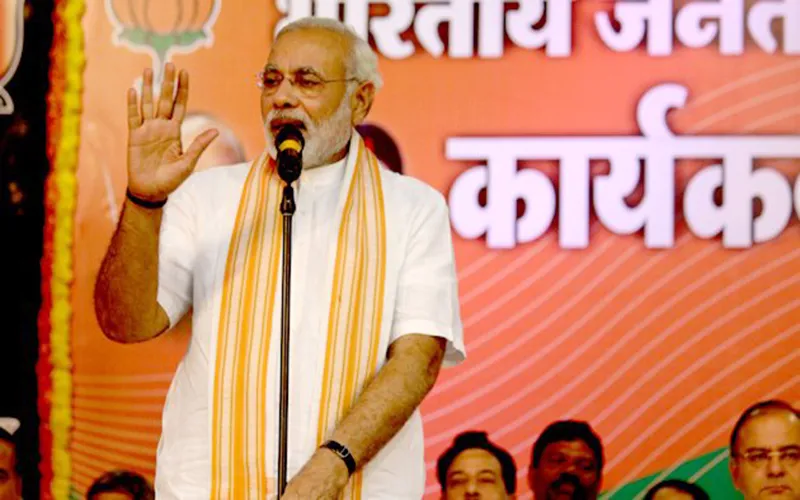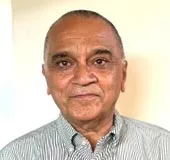-
CENTRES
Progammes & Centres
Location
Charismatic, centralised leadership, like Mr Modi's today and Indira Gandhi's earlier, whilst have a huge advantage in national elections, cannot single-handedly carry a local election. Delhi is likely to make this point to leaders yet again.

Delhi Assembly election 2015 is beginning to resemble a Greek tragedy for the Bharatiya Janata Party. What a change from the national elections in May 2014 when the BJP shone in comparison to the inept Congress Party. The motley crew of small regional or local parties (like the Aam Aadmi Party) also could not measure up to the exhilaration created by Prime Minister Narendra Modi who seemed capable of moving the nation, if not the Earth itself, so long as he was given a long enough lever to do so. The people responded positively in ample measure.
But charismatic, centralised leadership, like Mr Modi's today and Indira Gandhi's earlier, whilst have a huge advantage in national elections, cannot single-handedly carry a local election. Delhi is likely to make this point to leaders yet again.
It is highly unlikely that the BJP will get a majority when the votes are counted on February 10, 2015.
Why did the BJP juggernaut fail in Delhi? Here are five reasons, which are also lessons for the future:
First, there is no substitute for an empowered, decentralised leadership in state-level elections. National parties are, by their very nature, highly centralised. This is why their only option is continuous micro-management by a central election committee. In the instant of the BJP in Delhi, this was left till too late. The media blitz, the frenetic campaigning, the Cabinet ministers unleashed in end January to make up for inept local leadership, all served to reinforce the general impression of panic at the BJP high table and a crass attempt at wooing the voter purely for electoral gain.
Second, never underestimate your opponent. The BJP, which has a very thin leadership, got completely engrossed in its grand project of governing India and forgot that local votes have to be won locally. The fact that the BJP won all the Lok Sabha seats in Delhi by hanging onto Mr Modi's coattails should not have induced the lethargy it did.
In comparison, Arvind Kejriwal never let his guard down. He also had the advantage that the AAP got purged of interlopers, self-servers and free-lunchers; all of whom left it when its prospects seemed dim, post-May 2014 debacle in the Lok Sabha elections.
Lean and hungry, core AAP supporters kept up the leg work amongst the voters. They refined their agenda to suit the Muslims, Christians and disenchanted Congress supporters and carried their message door to door. India loves a fakir (ascetic) and Muffler King Kejriwal resembles one, even from the tinted window of his new Toyota Innova.
Third, performance matters. The BJP's biggest handicap in Delhi is the non-performance of the Union Territory's three municipal corporations ruled by it. These entities are dens of corruption and completely erode the national image of the BJP as being relatively above corruption. Prime Minister Modi came to power on the performance plank. But the sordid reality in these three local bodies did not change, not even in the last nine months of direct management by the Union government, significantly diluting the BJP promise of good governance.
Fourth, stopping petty corruption yields high dividends. The instant "governance reform", to the relief of Delhi's "underbelly" (street hawkers, small shopkeepers, auto drivers, casual workers, petty contractors), during the 49 days of the AAP government meant the complete stoppage of harassment by the police and municipal corporations. Once Mr Kejriwal resigned and governance devolved upwards to the Union government, petty corruption returned in full force. This reinforces the impression that Mr Modi's extraordinary executive capacity and expansive aspirations for India are not reflected in the rest of the leadership of the BJP.
In comparison, the AAP got "tempered" in defeat. They humbly accept that they erred in resigning. They appear more politically savvy. They kept up their strategy of ground-level contact and are hungry for power. The belief is strong that an AAP government will enforce "freedom from petty corruption".
Fifth, Delhi is a city of "winners" and winners do not take kindly to subaltern rule. Delhi has the highest per capita income in the country. Its public services are both highly subsidised and of superior quality than elsewhere. It is not surprising, therefore, that it has been a "destination city" for the last two decades. Delhi comprises people who have self-selected themselves as "winners": by entering government service through an exactingly competitive process; migrating from the surrounding areas with "fire in their belly" to earn a better life and small and medium scale business people in tourism, hospitality, IT and exports. These are highly entrepreneurial people and expect to see the same quality in their leader.
Mumbai is no different. Maharashtra's chief minister Devendra Fadnavis is so conscious of his relative youth (he is 44) and inexperience that he takes every opportunity to dispel the notion that he is just a shoe-in for Prime Minister Modi. He needs to do that if he is to govern the proud Maharashtrians credibly.In Kiran Bedi, the BJP had an independent, high profile, outspoken candidate for chief minister. But she was muzzled and has looked progressively more forlorn since her nomination on January 15. Gone is the assertive confidence. The Bedi baan (arrow) has been tamed into a submissive, humble "subaltern", basking only in the reflected glory of the Prime Minister. Not quite what she has been thus far.
In the change from being a leader to becoming a dutiful subordinate, Ms Bedi lost her edge to inspire. She now closely resembles any of the many "subaltern" leaders of the Congress, none of whom are encouraged to have an identity larger than the party. She is likely to suffer the same fate. She will have to wait for the tide to raise the BJP boat again before she can have a go at political power, most likely at the national level.
Finally, is the BJP's likely poor show in Delhi a harbinger of what will happen in Bihar? Nitesh Kumar's Janata Dal (United) would do well to bear in mind the lessons from Delhi's elections.
The BJP is today India's only real national party. Fighting the "Gir Lion" needs more than development statistics and caste calculations. Time to put the JD(U) boots on the ground to work.
(The writer is an Adviser to Observer Research Foundation, Delhi)
Courtesy: The Asian Age
The views expressed above belong to the author(s). ORF research and analyses now available on Telegram! Click here to access our curated content — blogs, longforms and interviews.

Sanjeev S. Ahluwalia has core skills in institutional analysis, energy and economic regulation and public financial management backed by eight years of project management experience ...
Read More +